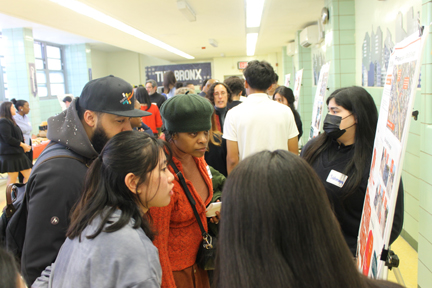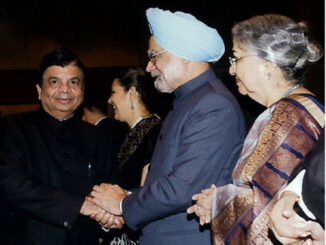
Taking place at The Laboratory School of Finance and Technology, the curriculum helps give seniors the planning tools to advocate for their communities.
NEW YORK (TIP): Department of City Planning Director Dan Garodnick, on April 4, announced that 45 high school seniors from The Laboratory School of Finance and Technology (MSHS223) in Mott Haven, the Bronx graduated from DCP’s youth engagement curriculum course, which teaches young people about planning concepts to help them become civic leaders and advocates in their communities. Click here for a gallery of photos from today’s ceremony.
“The great work that these students have produced through this course demonstrates that the next generation of planners is ready to craft a better future for New York City. Congratulations to them, the teachers, City Planning staff, and everyone who helped make this important curriculum possible,” said Dan Garodnick, Director of the Department of City Planning.
“Our students know their neighborhoods better than anyone, and I commend all the young people honored today for not only showing promise as future leaders of our city, but demonstrating their capacity as current leaders in their communities,” said New York City Schools (DOE) Chancellor David C. Banks. “I urge my fellow city leaders to really listen to what our students have to say and celebrate their voice.”
“By providing students with an opportunity to engage with city agencies and visit sites located within their communities, the Department of City Planning is providing the next generation of urban planners and advocates a ‘hands-on’ experience that will better equip them to make an impact on the future of their neighborhoods,” said New York City Economic Development Corporation (NYCEDC) President & CEO Andrew Kimball. “NYCEDC was thrilled to host this year’s students at the historic Kingsbridge Armory, where we had the opportunity to discuss what a redeveloped armory would mean for the community, and we look forward to hosting next year’s students.”
“Congratulations to the graduates of DCP’s youth engagement curriculum! This program equips our youth with leadership and city planning skills, and a deeper understanding of community engagement. By evaluating street improvement projects near their school, the students learned firsthand how to enhance their neighborhood’s livability and design safer streets. As future leaders, we are preparing them to address the challenges facing our city, how to become effective advocates, and how to actively contribute to our city’s improvement,” said New York City Department of Transportation (DOT) Commissioner Ydanis Rodriguez.
“I am proud of the work of each of the high school seniors of The Laboratory School of Finance and Technology MSHS 223 who successfully completed the Department of City Planning’s youth engagement curriculum course,” said Bronx Borough President Vanessa L. Gibson. “When you involve our youth at an early age in real-world projects and developments that address sustainability, transportation, and affordable housing, they are not only becoming informed citizens but are also more equipped to support their communities. I want to thank Department of City Planning Director Dan Garodnick and his team of planners, human resource experts, and urban designers along with staff from The Laboratory School for their collective work in creating this amazing opportunity for our teens.”
At today’s student fair, seniors presented their final projects to City government leaders, including representatives from DCP, DOE, DOT, EDC, the Department of Housing Preservation and Development, and the Department of Small Business Services, as well as community groups such as the Architectural League, Living City Project, and South Bronx Unite. The 45 seniors who participated in the youth engagement curriculum were divided into three classes, each of whom did a mock neighborhood study of Bronx Community District 1. Each study was exhibited through five displays – one that showed a plan overview and four that covered key topics studied during their course: housing, economic development, sustainability/resiliency, and transportation.
The curriculum was crafted by DCP’s Community Planning and Engagement division and Civic Engagement Studio, and included lessons on urban planning concepts, planning history, urban design, and advocacy and decision-making, including how the public review process works. DCP is dedicated to putting communities at the forefront of planning conversations about the future of their neighborhoods.
“Over the past eight weeks, DCP’s Community Planning and Engagement division has empowered F&T seniors to articulate and advocate for their visions of a more equitable and sustainable city. Students transitioned from observers to active participants in the city planning process, proposing insightful plans based on their lived experiences and aspirations for the South Bronx. I would like to thank DCP for equipping students with both the platform and audience to shape the future of economic development, housing, sustainability, and transportation in our city,” said Hope Grossman Devore, government teacher at The Laboratory School of Finance and Technology.
“Developing a project about affordable housing was a really enjoyable experience. It allowed me and others to contribute to the future and help our community. I learned about the importance of communication during this unit because that way we can create a strong relationship between people, leaders, and communities when it comes to city planning,” said Edwin Lucas, senior at The Laboratory School of Finance and Technology.
“I really enjoyed brainstorming ideas and finding solutions for creating better living spaces in the city planning project. I learned about economic development and discovered how vital it is to invest in young people through proper training and support because we are the future generation. It’s exciting to think about how empowering young people in the workforce can lead to a stronger economy and brighter future for all of us,” said Gideon Owusu, senior at The Laboratory School of Finance and Technology.
Now in its third year, the eight-week curriculum began on February 5, 2024, and was structured to build students’ advocacy skills and elevate their voices and ideas on neighborhood needs. The course featured planners and urban designers as well as teachers from The Laboratory School; and included input from City agencies with deep expertise in housing, economic development, planning, and much more.
All three classes went on site visits that covered the four main planning topics. For housing and sustainability, the students visited Via Verde, an income-restricted, energy-efficient building in the South Bronx. To learn more about economic development, the students went on a guided tour of the Kingsbridge Armory with the New York City Economic Development Corporation. For transportation, they joined the New York City Department of Transportation at street improvement projects near their school, measuring street widths and analyzing vehicle speeds.
DCP’s Community Planning and Engagement division continues to explore opportunities to expand the program to other schools and get more students involved in planning and civic advocacy.
Department of City Planning
The Department of City Planning (DCP) plans for the strategic growth and development of the City through ground-up planning with communities, the development of land use policies and zoning regulations applicable citywide, and its contribution to the preparation of the City’s 10-year Capital Strategy. DCP promotes housing production and affordability, fosters economic development and coordinated investments in infrastructure and services, and supports resilient, sustainable communities across the five boroughs for a more equitable New York City.
In addition, DCP supports the City Planning Commission in its annual review of approximately 450 land use applications for a variety of discretionary approvals. The Department also assists both government agencies and the public by advising on strategic and capital planning and providing policy analysis, technical assistance and data relating to housing, transportation, community facilities, demography, zoning, urban design, waterfront areas and public open space.
.





Be the first to comment